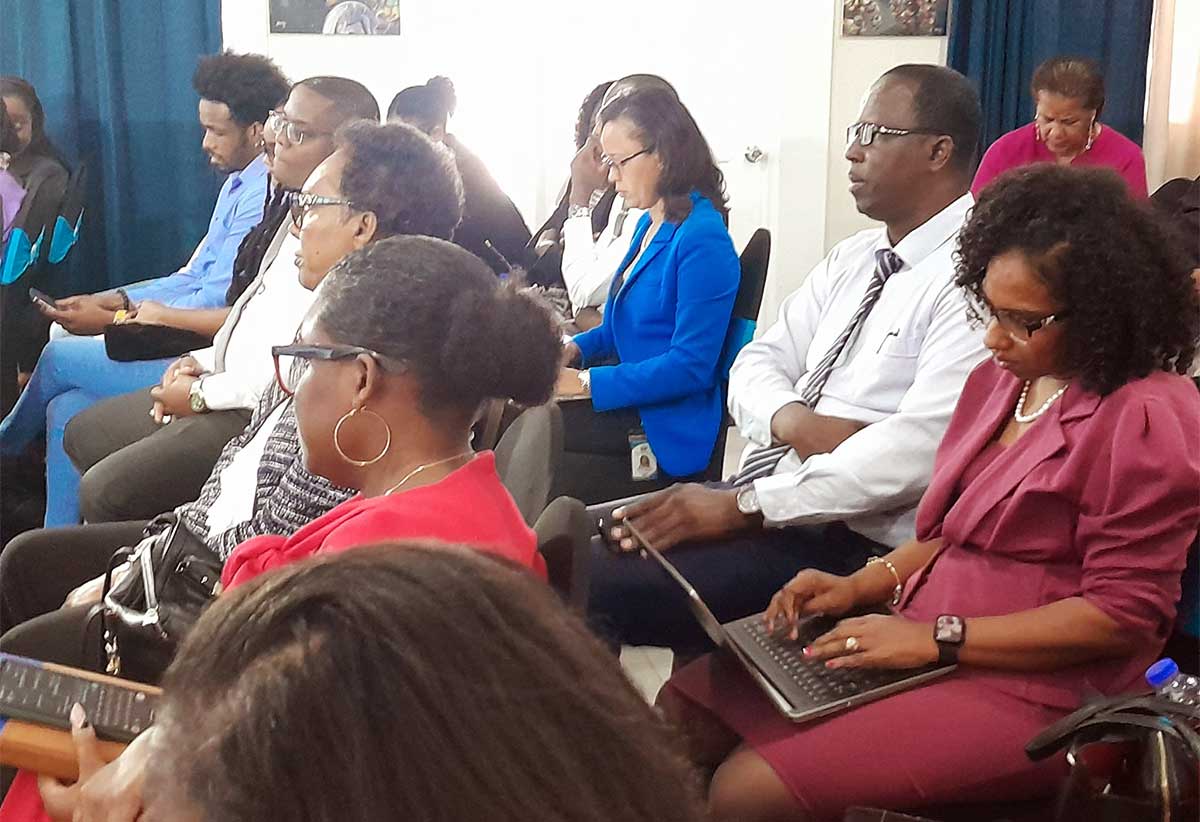
Issues revolving around the labour market, high prices of commodities, shipping supplies and other factors hampering the economic fortunes of citizens in the country- was the theme of the discourse of last week’s Public Consultation on Inflation.
The session organsised by the Ministry of Commerce in collaboration with the Ministry of Finance sought to elicit suggestions from a cross-section of public and private entities on measures that can be taken to lessen the economy burden borne by the average consumer.
In addition, a panel consisting of business persons, representing various sectors added more stimulus to the agenda with thought-provoking presentations that stirred the curiosity of attendees and followers online.
While delivering the opening statements Commerce Minister Emma Hippolyte underscored the magnitude of the discussion that delved into high inflation costs globally and the urgency of the situation affecting consumers. Over the past two years, she noted, focus has been directed at the high prices on goods and services across all sectors of “our domestic economy”, particularly, on food, retail, and the distribution sector.
“This sentiment regarding a marked and sustained increase in prices has been so widespread and broad-based that it culminated in the crescendo of voices, even resulting in a petition,” Minister Hippolyte, told the gathering at the Bel Jou Hotel, in upper Castries.
The minister noted that there has been an incessant plea from consumers to government to intervene and help bring down the exorbitant prices on some basic commodities and other stuff that are depleting the finances of the average citizen.
Where did this latest rise in inflation come from?, the minister queried, as she presented statistics on the rising costs of goods and services.
“While there are many causes of inflation, such as increases in the price of input or the money supply – the recent spike in inflation, which the world has been experiencing over the period 2021 to 2023, has been largely attributed to the post-Covid-19 era,” said Hippolyte.
She observed that as countries began to recover from the Covid-19 pandemic, disrupted global supply chains made it unconducive to meet the surge in global demands for various commodities, including oil and food. And, she said, this was “compounded by shipping delays and other logistics and related bottlenecks as economies reopened”.
Added Hippolyte: “This supply shortfall and imbalance in global markets served to drive prices upward resulting in a peak global inflation in 2022, which ranged between 7.2 to 9.8 %.
“In advanced economies, such as the US, the European areas and emerging markets, it has been the highest in decades …and the highest in 40 years. In Saint Lucia’s case, inflation likewise, surged to an unprecedented high causing much anxiety and consternation among the population.”
The minister said government is concerned about inflation, “because it has a deleterious impact on individuals and households in a number of ways.”
Consequently, she said, it slows down economic growth, reduces consumers purchasing power, and increases the cost of living. “Left unchecked, inflation also reduces the real value of our savings and makes creditors worse off as a real valued of debt payment reduces as inflation rises,” the minister explained.
Inflation goes against “the grain of good economic management”, Hippolyte added, and therefore central banks around governments globally, “do all that is possible to take corrective action to contain inflationary impulses in an attempt to restore price stability, which is critical to the attainment of prosperity and economic growth.”
While there are reports of some de-escalation in the inflation rates, nevertheless, the minister contends it has not been enough to meet the demands in the labour market, relating to wages and salaries “resulting in an erosion of purchasing power”.
Toward this cause, she said, government stands ready to take measures in the coming fiscal year, wherever necessary to stem this tide and to implement measures, to help deal with the “inflationary price shocks, especially on the more vulnerable members of our society.”
The minster cited some of government’s intervention to help alleviate the economic plight, including subsidies on basic food items, coking gas, tax relief and other measures.
She said while government policies have predominantly focused on protecting or advancing consumer welfare “we are also equally concerned about our business community as producers and providers of goods and services.”
Thus, she added, government plans to continue working with manufacturers and retailers to monitor and regulate the conduct of business in the country.
Hippolyte said the public consultation constituted part of government’s approach to indulge the public “in constructive dialogue on a subject of utmost importance”.
The minister asserted that the exercise was undertaken: “As part of government’s approach to policy formulation based on more participatory and interactive relationship with our principal clients …the consumer, as well, the business community and the general public.”





